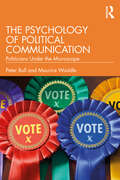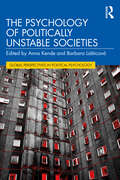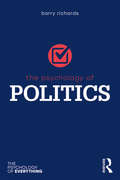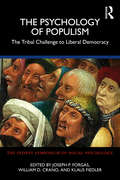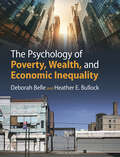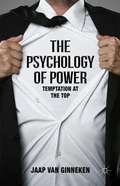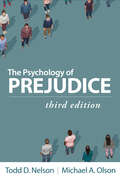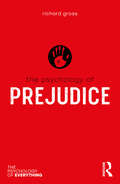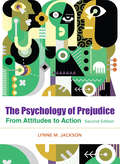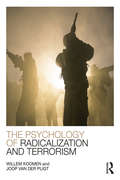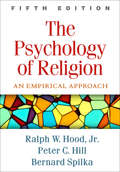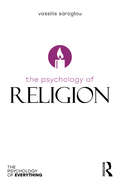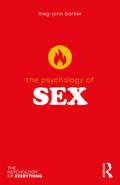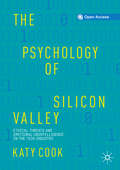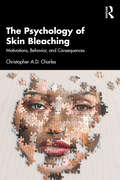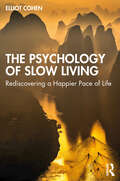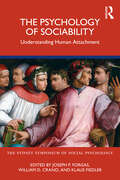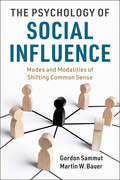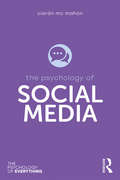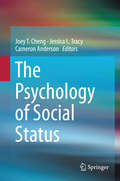- Table View
- List View
The Psychology of Political Communication: Politicians Under the Microscope
by Peter Bull Maurice WaddleContemporary politics is mass-communication politics. Politicians are not only seen and heard, they are seen and heard in close-up through television appearances, speeches, interviews, and on social media. In this book, the authors analyse the ways in which politicians communicate with each other, the media, and the electorate; they also discuss the implications of contemporary political discourse on the democratic process as a whole. Politicians in interviews are typically castigated for their evasiveness. However, microanalytic research shows that there is more to political discourse than this apparent ambiguity. This book reveals how equivocation, interruptions, and personal antagonism can offer valuable insights into a politician’s communicative style. The authors review their empirical research not only on political interviews, but also on speeches, parliamentary debates, and political journalism. Further insights include how political speakers interact with their audiences, how party leaders engage in adversarial discourse at PMQs, and how the spoken messages of politicians can be affected by modern journalistic editing techniques. Thereby, this research generates greater awareness of communicative practices in a diverse range of political contexts. While the interviews and parliamentary debates analysed pertain to UK politics, the speeches also draw on the USA, and European and Far Eastern nations. This engaging book is a fascinating resource for students and academics in psychology, politics, communication, and other related disciplines such as sociology and linguistics. The research is also extremely relevant to policy makers and practitioners in politics and political journalism.
The Psychology of Political Polarization
by Prooijen, Jan-Willem vanThe Psychology of Political Polarization was inspired by the notion that, to understand the momentum of radical political movements, it is important to understand the attitudes of individual citizens who support such movements. Leading political psychologists have contributed to this important book, in which they share their latest ideas about political polarization – a complex phenomenon that cannot be traced back to a single cause, and that is associated with intolerance, overconfidence, and irrational beliefs. The book explores the basis of political polarization as being how citizens think and feel about people with a different worldview, how they perceive minority groups, and how much they trust leaders and experts on pressing societal issues such as climate change, health, international relations, and poverty. The chapters are organized into two sections that examine what psychological processes and what social factors contribute to polarization among regular citizens. The book also describes practical strategies and interventions to depolarize people. The book offers a state-of-the-art introduction to the psychology of political polarization which will appeal to the academic market and political professionals.
The Psychology of Politically Unstable Societies (Global Perspectives in Political Psychology)
by Anna Kende Barbara LášticováThis volume presents the latest developments in the field of political psychology by exploring the psychological processes that underlie political instability and how these can be addressed with psychological interventions. Written by a team of international leading researchers, the book critically re-evaluates the relevance of concepts primarily developed in WEIRD (Western, Educated, Industrialized, Rich and Democratic) contexts, for non-WEIRD societies. It focuses particularly on East-Central Europe and South Africa, showing how they enjoy some privileges of WEIRD countries but are also characterized by a troubled history and relative deprivation. Covering psychological concepts such as political trust, conspiracy thinking, authoritarianism, populism, autochthony, social identity and prejudice, the chapters illustrate that psychology has the tools to explain the recurring and shared problems of these societies. This original book is ideal for scholars and students in social psychology, political science and social science. It will also be useful reading for policy makers, political analysts and anyone who wishes to understand their role in creating more stable and more just societies.
The Psychology of Politics (The Psychology of Everything)
by Barry RichardsHow do some political leaders capture popular support? What is the appeal of belonging to a nation? Can democracy thrive? The Psychology of Politics explores how the emotions which underpin everyday life are also vital in what happens on the political stage. It draws on psychoanalytic ideas to show how fear and passion shape the political sphere in our changing societies and cultures, and examines topical social issues and events including Brexit, the changing nature of democracy, activism, and Trump in America. In a changing global political climate, The Psychology of Politics shows us how we can make sense of what drives human conduct in relation to political ideas and action.
The Psychology of Populism: The Tribal Challenge to Liberal Democracy (Sydney Symposium of Social Psychology)
by Klaus Fiedler William D. Crano Joseph P. ForgasThe recent rise of populist politics represent a major challenge for liberal democracies. This important book explores the psychological reasons for the rise of populism, featuring contributions from leading international researchers in the fields of psychology and political science. Unlike liberal democracy based on the Enlightenment values of individual freedom, autonomy and rationality, both right-wing and left-wing populism offer collectivist, autocratic formulations reminiscent of the evolutionary history and tribal instincts of our species. The book offers a comprehensive overview of the psychology of populism, covering such phenomena as identity seeking, anger and fear, collective narcissism, grievance, norms, perceptions of powerlessness and deprivation, authoritarianism, nationalism, radicalism, propaganda and persuasion, ethnocentrism, xenophobia and the effects of globalization. The book is divided into four parts. Part I deals with the motivational and emotional factors that attract voters to populist causes, and the human needs and values that populist movements satisfy. Part II analyzes the cognitive features of populist appeals, especially their emphasis on simplicity, epistemic certainty and moral absolutism. Part III turns to one of the defining features of populism: its offer of a powerful tribal identity and collectivist ideology that provide meaning and personal significance to its followers. Finally, in Part IV, the propaganda tactics used by populist movements are analysed, including the role of charismatic leadership, authoritarianism, and nationalism and the use of conspiracy narratives and persuasive strategies. This is fascinating reading on a highly topical issue. The book will be of interest to students, researchers, and applied professionals in all areas of psychology and the social sciences as a textbook or reference book, and to anyone interested in the global rise of populism.
The Psychology of Poverty, Wealth, and Economic Inequality
by Heather E. Bullock Deborah BelleEconomic inequality is a defining issue of our time, with a handful of individuals in the United States today owning more wealth than half the population in the country. What are the psychological consequences of living in a profoundly unequal society? This comprehensive textbook is among the first to examine poverty, wealth, and economic inequality from a psychological perspective. Written by two leading scholars in the field, it provides an intersectional analysis of the impact of economic inequality on cognitive, emotional, interpersonal, intergroup, physiological, and health outcomes. Students are introduced to the diverse methods used to study poverty, wealth, and economic inequality and the strengths and weaknesses of various approaches, while the text focuses on solutions at the individual, community, and national levels to restore optimism and encourage action. Chapter features include exercises and reflection questions that help students think critically about the implications of research findings for their own lives.
The Psychology of Power
by Jaap Van GinnekenThe author tests the hypothesis that hubris and the Bathsheba syndrome tend to affect all top leaders, by zooming in on the best known and very highest executives of our own day and age, and examines the psychological forces tugging at the top level of political leadership.
The Psychology of Prejudice
by Todd D. Nelson Michael A. OlsonAddressing core questions about prejudice and stereotyping--their causes, consequences, and how to reduce them--this noted text is now in a thoroughly revised third edition with 50% new material. Written in an engaging, conversational style, the book brings social-psychological theories and research to life with compelling everyday examples. The text explores the personal and societal impacts of different forms of prejudice. Students learn about the cognitive, emotional, motivational, contextual, and personality processes that make stereotyping and prejudice more (or less) likely to occur. The book reviews anti-bias interventions and critically evaluates the evidence for their effectiveness. Every chapter concludes with an instructive glossary and discussion questions. New to This Edition *Full chapter on implicit prejudice. *Chapters on anti-gay and anti-fat prejudice. *New or updated discussions of timely topics: how children develop prejudice, structural racism, benevolent versus hostile sexism, how contact reduces prejudice, and more.
The Psychology of Prejudice (The Psychology of Everything)
by Richard GrossWhy do we develop extreme attitudes to others? Can our personality contribute to our prejudices? How do we reduce prejudice and discrimination? The Psychology of Prejudice explores different forms of prejudice and discrimination, from racial jokes to genocide. It looks at what might cause our prejudiced attitudes, including our personalities, social influences, group identity, and evolutionary factors, and how prejudice can be reduced through education, campaigning, and consciousness raising. Offering insights into a topic of great public concern and debate, The Psychology of Prejudice shows us how we can confront our prejudiced attitudes and contribute to greater tolerance and understanding.
The Psychology of Prejudice: From Attitudes to Social Action
by Lynne M. JacksonThis second edition of Lynne Jackson&’s seminal text presents a significantly updated review of the psychological underpinnings of prejudicial attitudes and behaviors. Given the weaponization of cultural and ideological differences in politics, education, and social media today, the need to understand and fight prejudice is urgent. Jackson synthesizes new research from various areas of psychology to analyze contemporary examples of prejudice, including anti-immigrant policies, police violence against minorities, anti-woman and LGBTQ backlash, and ageist cultural biases. She also explores frequently overlooked issues related to prejudice, such as environmental inequality and speciesism. Drawing from literature in social, developmental, evolutionary, and personality psychology, Jackson explores the environmental and biological roots of prejudice, explaining how societal factors and human predispositions shape how people understand and respond to diversity. She draws connections between prejudice and other social justice issues showing how it is related to greater social problems like inequality and political polarization. She also offers readers a blueprint for overcoming these deeply embedded biases by improving intergroup attitudes and building communities to create progressive social change.
The Psychology of Prejudice: The Ontario Symposium, Volume 7 (Ontario Symposia on Personality and Social Psychology Series #Vol. 7)
by James M. Olson Mark P. ZannaThis volume consists of expanded and updated versions of papers presented at the Seventh Ontario Symposium on Personality and Social Psychology. The series is designed to bring together scholars from across North America who work in the same substantive area, with the goals of identifying common concerns and integrating research findings. The topic of this symposium was the psychology of prejudice and the presentations covered a wide variety of issues. The papers present state-of-the-art research programs addressing prejudice from the point of view of both the bigoted person as well as the victim of bigotry. The chapter authors confront this issue from two major -- and previously separate -- research traditions: the psychology of attitude and intergroup conflict. The chapters are organized in the following sequence of topics: the determinants and consequences of stereotypes, individual differences in prejudicial attitudes, intergroup relations, the responses of victims to prejudice and discrimination, and an integrative summary/commentary. Illustrating both the diversity and vitality of research on the psychology of prejudice, the editors hope that this volume will stimulate further research and theorizing in this area.
The Psychology of Quality of Life
by M. Joseph SirgyThe second edition will be an update and further elaboration of the literature related to subjective well-being, happiness, and life satisfaction. It will have a new substantial section that focuses on reviewing much of the literature of subjective well-being within specific life domains (social life, material life, leisure life, work life, community life, spiritual life, family life, health life, sex life, travel life, etc.) In the 1st edition the research in these various life domains was discussed only briefly. The second edition will maintain the same organizational structure of the first edition; that is, Part 1 will focus on introduction (definitions and distinctions; examples of measures of subjective well-being, happiness, and life satisfaction; and motives underlying subjective well-being). Part 2 will focus on psychological strategies that are allow people to optimize subjective well-being by engaging in psychological processes related to the relationship between and among life domains (e.g., social life, family life, love life, spiritual life, community life, financial life, etc.) This part will contain four chapters related to these various "inter-domain" processes: bottom-up spillover, top-down spillover, horizontal spillover, and compensation. Part 3 of the book will focus on "intra-domain" psychological strategies designed to optimize subjective well-being. These include re-evaluation based on personal history, re-evaluation based on self-concept, re-evaluation based on social comparison, goal selection, goal implementation and attainment, and re-appraisal. Part 4 of the book will focus on balance processes--how people attempt to create balance in their lives using psychological processes within specific life domains (intra-domain strategies) and processes that relate one domain to another (inter-domain strategies).
The Psychology of Radical Social Change: From Rage to Revolution
by Jaan Valsiner Fathali M. Moghaddam Brady WagonerSince 2011 the world has experienced an explosion of popular uprisings that began in the Middle East and quickly spread to other regions. What are the different social-psychological conditions for these events to emerge, what different trajectories do they take, and how are they are represented to the public? To answer these questions, this book applies the latest social psychological theories to contextualized cases of revolutions and uprisings from the eighteenth to the twenty-first century in countries around the world. In so doing, it explores continuities and discontinuities between past and present uprisings, and foregrounds such issues as the crowds, collective action, identity changes, globalization, radicalization, the plasticity of political behaviour, and public communication.
The Psychology of Radicalization and Terrorism
by Joop Van Der Pligt Willem KoomenTerrorism and radicalization have a long history, but in recent years their prominence has been a particularly conspicuous and influential feature of the global political landscape. This important book presents an overview of the processes involved in radicalization and terrorism, and introduces a systematic framework which captures the most crucial individual and social factors involved in determining these processes. The authors begin by considering the possible role of prejudice, economic deprivation, and discrimination, and the cognitive responses and emotions they can trigger. Such responses tend in turn to increase the importance of group membership, and promote intergroup differentiation and polarization, a process which is often accompanied by more pronounced and more extreme religious and ideological beliefs. The book also describes the role of cultural values and social climate in processes of radicalization, as well as the role of personality factors and demographics such as age and marital status. As for violent terrorist action itself, this final most radical stage is elicited by a number of group factors such as groupthink, isolation, and leadership. Certain cognitive mechanisms - for example, dehumanizing the target and attributing responsibility elsewhere - can also provide excuses for violence. The book explores why some groups turn to violence and others don't, and it addresses processes of disengagement, deradicalization programs, and other methods used to inhibit the spread of radicalization and terrorism. The Psychology of Radicalization and Terrorism takes a unique and systematic approach to a vital topic, integrating knowledge from diverse literatures, and using social psychology as a basis for comprehending human behaviour. It will be essential reading for students and researchers from all disciplines seeking a greater understanding of terrorism and violent political conflict in all its forms.
The Psychology of Religion, Fifth Edition: An Empirical Approach (Archive For The Psychology Of Religion/ Archiv Fur Religionspsychologie Ser. #Vol. 27)
by Bernard Spilka Ralph W. Hood Jr. Peter C. HillKeeping up with the rapidly growing research base, the leading graduate-level psychology of religion text is now in a fully updated fifth edition. It takes a balanced, empirically driven approach to understanding the role of religion in individual functioning and social behavior. Integrating research on numerous different faith traditions, the book addresses the quest for meaning; links between religion and biology; religious thought, belief, and behavior across the lifespan; experiential dimensions of religion and spirituality; the social psychology of religious organizations; and connections to coping, adjustment, and mental disorder. Chapter-opening quotations and topical research boxes enhance the readability of this highly instructive text. New to This Edition *New topics: cognitive science of religion; religion and violence; and groups that advocate terrorist tactics. *The latest empirical findings, including hundreds of new references. *Expanded discussion of atheism and varieties of nonbelief. *More research on religions outside the Judeo-Christian tradition, particularly Islam. *State-of-the-art research methods, including techniques for assessing neurological states.
The Psychology of Religion: Structuring The Religious Experience (The Psychology of Everything #10)
by Vassilis SaroglouDoes religion positively affect well-being? What leads to fundamentalism? Do religious beliefs make us more moral? The Psychology of Religion explores the often contradictory ideas people have about religion and religious faiths, spirituality, fundamentalism, and atheism. The book examines whether we choose to be religious, or whether it is down to factors such as genes, environment, personality, cognition, and emotion. It analyses religion’s effects on morality, health, and social behavior and asks whether religion will survive in our modern society. Offering a balanced view, The Psychology of Religion shows that both religiosity and atheism have their own psychological costs and benefits, with some of them becoming more salient in certain environments.
The Psychology of Sex (The Psychology of Everything)
by Meg John BarkerWhat can psychology teach us about sex? How do different bodies and brains respond sexually? How can we prevent people being stigmatised for their sexuality? The Psychology of Sex takes you on a tour through the different ways that psychologists have created and sustained certain understandings of sex and sexuality. Bearing in mind the subjective nature of sex, the book explores cultural concerns around sexualisation, pornography, and sex addiction, as well as drawing on research from sexual communities and the applied area of sex therapy. When so much of our relationship to sex happens in the mind, The Psychology of Sex shows us how important it is to understand where our ideas about sex come from.
The Psychology of Silicon Valley: Ethical Threats and Emotional Unintelligence in the Tech Industry
by Katy CookMisinformation. Job displacement. Information overload. Economic inequality. Digital addiction. The breakdown of democracy, civility, and truth itself.This open access book explores the conscious and unconscious norms, values, and characteristics that drive behaviors within the high-tech capital of the world, Silicon Valley, and the sector it represents. In an era where the reach and influence of a single industry has the potential to define the future of our world, it has become apparent just how little we know about the organizations driving these changes. The Psychology of Silicon Valley offers a revealing look inside the mind of world’s most influential industry and how the identity, culture, myths, and motivations of Big Tech are harming society. The book argues that the bad values and lack of emotional intelligence borne in the vacuum of Silicon Valley will have lasting consequences on everything from social equality to the future of work to our collective mental health. Katy Cook expertly walks us through the psychological landscape of Silicon Valley, including its leadership, ethical, and cultural problems, and artfully explains why we cannot afford to ignore the psychology and values that are behind our technology any longer.
The Psychology of Skin Bleaching: Motivations, Behavior, and Consequences
by Christopher A.D. CharlesThis book examines the controversial global phenomenon of skin bleaching. It uses a social psychological approach to explain the motivations, behavior, and medical consequences of the practice, considering why some people use products to lighten their complexion.Written by a world-leading expert in skin bleaching, the book takes a nuanced approach to understanding skin bleaching that looks further than the standard claims of low self-esteem, a form of self-hatred. It goes beyond looking at individual personality traits to consider the cultural norms, values, shared social meanings, and practices about race and skin color, showing how shared meanings from social representation guide people’s behavior in their culture. The book draws predominantly on research from Jamaica, but considers how skin bleaching is practised in different cultural contexts across the Americas, Europe, Asia, and Africa. Chapters consider the history of race and skin color, how skin color and race are portrayed in popular culture, how skin color and race form two of some people’s social identities, and how skin bleaching has become an established social practice in many settings. It also looks at the consequences of skin bleaching and suggests policy responses that could help curb the practice.The Psychology of Skin Bleaching will be highly relevant reading for students and scholars in the fields of psychology, Black and Caribbean studies, sociology, anthropology, cultural studies, and health. It will also be of interest to professionals including psychiatrists and public health practitioners, and anyone interested in better understanding the psychological and bodily expressions of racialized discrimination and oppression.
The Psychology of Slow Living: Rediscovering a Happier Pace of Life
by Elliot CohenThis fascinating book explores the concept of slow living, offering a philosophical and psychological exploration of the need for a slower pace of life. It advocates for reclaiming and rediscovering more natural and human ways of being.In a digital age, which is dominated by an increasingly tyrannical trinity of speed, efficiency and productivity, the author challenges the pernicious ideal of instant gratification, perpetuated by modern consumer culture. This book examines alternative ways of being through re-examining the Wisdom Traditions of Hinduism, Buddhism, Daoism and Judaism through an ongoing and engaging dialogue with psychology and psychotherapy, including insights from environmental psychology, ecopsychology and cyberpsychology. The book argues against the trend for personal responsibility, adaptability and resilience, and the idea that stress is the ‘new normal'. Instead, it proposes a radical shift in paradigm, promoting not for collectively rising up and overthrowing this system but for communally sitting down and reimagining.The Psychology of Slow Living is a unique exploration of the benefits of the slow living movement and taps into contemporary debates around the way we should be living our lives, making it an ideal resource for students and academics in psychology, philosophy and the social sciences, as well as individuals interested in alternative lifestyles and spirituality.
The Psychology of Sociability: Understanding Human Attachment (Sydney Symposium of Social Psychology)
by Klaus Fiedler Joseph P. Forgas William CranoThis edited volume brings together the latest research in understanding the nature, origins, and evolution of human sociability, one of the most intriguing aspects of human psychology. Sociability—our sophisticated ability to interact with others, imagine, plan, and execute interdependent behaviours—lies at the heart of our evolutionary success, and is the most important prerequisite for the development of increasingly elaborate civilizations. With contributions from internationally renowned researchers in areas of social psychology as well as anthropology and evolutionary psychology, this book demonstrates the role of social psychology in explaining how human sociability evolved, how it shapes our mental and emotional lives, and how it influences both large-scale civilizational practices and intimate interpersonal relations. Chapters cover the core psychological characteristics that shape human sociability, including such phenomena as the role of information exchange, affective processes, social norms, power relations, personal relationships, attachment patterns, personality characteristics, and evolutionary pressures. Featuring a wide variety of empirical and theoretical backgrounds, the book will be of interest to students and researchers in all areas of the social sciences, as well as practitioners and applied professionals who deal with issues related to sociability in their daily lives.
The Psychology of Social Conflict and Aggression (Sydney Symposium of Social Psychology)
by Arie W. Kruglanski Kipling D. Williams Joseph P. ForgasThis book provides an up-to-date integration of some of the most recent developments in social psychological research on social conflict and aggression, one of the most perennial and puzzling topics in all of psychology. It offers an informative, scholarly yet readable overview of recent advances in research on the nature, antecedents, management, and consequences of interpersonal and intergroup conflict and aggression. The chapters share a broad integrative orientation, and argue that human conflict is best understood through the careful analysis of the cognitive, affective, and motivational processes of those involved in conflict situations, supplemented by a broadly-based understanding of the evolutionary, biological, as well as the social and cultural contexts within which social conflict occurs.
The Psychology of Social Influence: Modes and Modalities of Shifting Common Sense
by Gordon Sammut Martin W. BauerThis volume brings together the full range of modalities of social influence - from crowding, leadership, and norm formation to resistance and mass mediation - to set out a challenge-and-response 'cyclone' model. The authors use real-world examples to ground this model and review each modality of social influence in depth. A 'periodic table of social influence' is constructed that characterises and compares exercises of influence in practical terms. The wider implications of social influence are considered, such as how each exercise of a single modality stimulates responses from other modalities and how any everyday process is likely to arise from a mix of influences. The book demonstrates that different modalities of social influence are tactics that defend, question, and develop 'common sense' over time and offers advice to those studying in political and social movements, social change, and management.
The Psychology of Social Media (The Psychology of Everything)
by Ciarán Mc MahonAre we really being ourselves on social media? Can we benefit from connecting with people we barely know online? Why do some people overshare on social networking sites? <P><P>The Psychology of Social Media explores how so much of our everyday lives is played out online, and how this can impact our identity, wellbeing and relationships. It looks at how our online profiles, connections, status updates and sharing of photographs can be a way to express ourselves and form connections, but also highlights the pitfalls of social media including privacy issues. <P><P>From FOMO to fraping, and from subtweeting to selfies, The Psychology of Social Media shows how social media has developed a whole new world of communication, and for better or worse is likely to continue to be an essential part of how we understand our selves.
The Psychology of Social Status
by Jessica L. Tracy Joey T. Cheng Cameron AndersonThe Psychology of Social Status outlines the foundational insights, key advances, and developments that have been made in the field thus far. The goal of this volume is to provide an in-depth exploration of the psychology of human status, by reviewing each of the major lines of theoretical and empirical work that have been conducted in this vein. Organized thematically, the volume covers the following areas: - An overview of several prominent overarching theoretical perspectives that have shaped much of the current research on social status. - Examination of the personality, demographic, situational, emotional, and cultural underpinnings of status attainment, addressing questions about why and how people attain status. - Identification of the intra- and inter-personal benefits and costs of possessing and lacking status. - Emerging research on the biological and bodily manifestation of status attainment - A broad review of available research methods for measuring and experimentally manipulating social status A key component of this volume is its interdisciplinary focus. Research on social status cuts across a variety of academic fields, including psychology, sociology, anthropology, organizational science others; thus the chapter authors are drawn from a similarly wide-range of disciplines. Encompassing the current state of knowledge in a thriving and proliferating field, The Psychology of Social Status is a fascinating and comprehensive resource for researchers, students, policy-makers, and others interested in learning about the complex nature of social status, hierarchy, dominance, and power.
